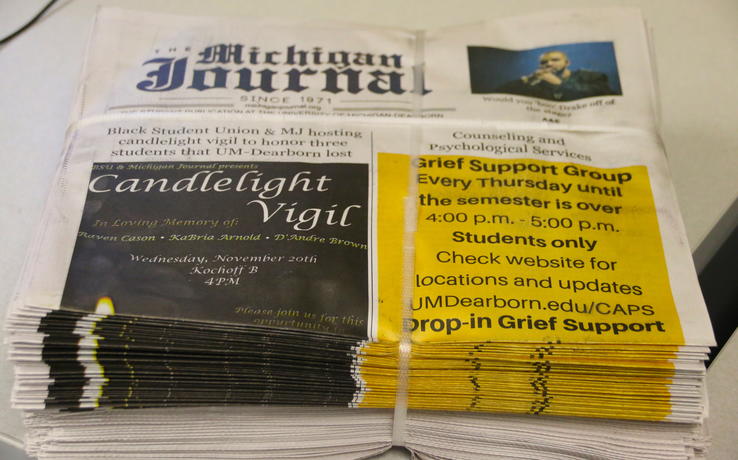
This article was originally published on December 5, 2019.
Cars were parked in the middle of the street. People were holding signs. And Chanel Stitt was stuck in a traffic jam on her way to school.
But, as she sat stranded in her car, the emotion she felt wasn’t frustration. It was curiosity. So she got out of her vehicle to see what was going on.
What Stitt saw was a protest. So she, at the time only 17, decided to ask people what was going on. She got quotes. Made sure all sides were represented. And then wrote up a story that was published in a local paper.
That’s when Stitt knew journalism was her calling. Stitt, editor-in-chief of the Michigan Journal and graduating senior, says her time at UM-Dearborn has only solidified her love of information sharing.
Sitting in the Michigan Journal office, Stitt — a Journalism and Screen Studies (JASS) major — typically spends from morning to night (thanks, production days) in the University Center or in the College of Arts, Sciences, & Letters Building. She says her time on campus has helped strengthen her leadership skills, she’s the president of Alpha Kappa Alpha sorority, Inc. and served on Public Relations Student Society of America’s executive board; has given her social media and marketing experience, she works in the CASL Dean’s Office doing promotion work; and has encouraged her to make community connections, she’s an active member of the National Association of Black Journalists.
As she closes out her time at UM-Dearborn, Stitt won’t miss the sometimes difficult time balance of classes, internships, sorority life and the Michigan Journal — although she knows there’s a life lesson in there. “I now know I can handle whatever you throw at me.”
But she will miss her mentors and professors. She says the diversity of skills within the JASS faculty — with Telly awards for documentary filmmaking and Pulitzer Prizes for writing — have prepared her for what’s next. But the education goes beyond skillset; there’s also been important life lessons.
“One of most valuable pieces of advice I’ve been given here is that criticism is going to happen and I need to find ways to cope with it and not let it drag me down,” she says. “Now when I read comments, I treat it as a reframing exercise. If there is something constructive in there, I’ll write it down so that I can do better next time. Otherwise, I disregard it.”
Stitt’s experiences have gone far beyond the classroom and MJ newsroom. To see what different news telling avenues had to offer, she’s also had a variety of internships. Stitt gained marketing and public relations experience during an internship at Garden City Hospital, which earned her the designation of Intern of the Year in 2018. She’s also wrote for Model D Media, where she had the most read story of 2018. And she worked at WDIV-Local 4 where she’d travel to filming locations with broadcast journalists like Koco McAboy and Hank Winchester.
During her Channel 4 internship, Stitt saw the importance of broadcast journalism’s visual news reporting. Stitt was involved with a news segment on how Detroit neighborhood residents were renting from landlords who weren’t keeping up the facilities — many of the homes she went into were heated with ovens, lacked running water and had mold. She said landlords were ignoring the tenants concerns so the news crews stepped in to get answers. After the story aired — with residents speaking about the conditions and images backing up their words — Stitt saw how getting the information to the public put pressure on the landlords to make changes.
“It was a powerful thing to see. Journalists share information — that includes all sides and is objective — to help people. I have two people read everything I put out there to make sure any bias I may have doesn’t show. We want to shed light on what’s going on and connect people to resources, to answers.
“What we do is for the public and we can’t take criticism personally. Sometimes that’s hard to remember when criticism comes from many directions, even from the highest authority in the country. But we need to remember that it’s not about us. We have a job to do and we need to do it well no matter what. The public good depends on it.”
And whether that means asking tough questions to uncover truths or leaving the comfort of her vehicle to cover a protest, this Fall 2019 graduate will be there.




